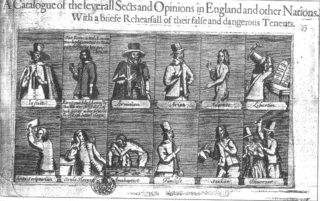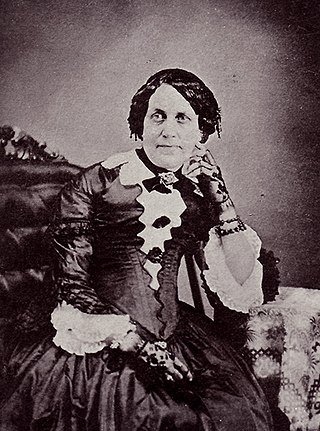Related Research Articles

John Woolman was an American merchant, tailor, journalist, Quaker preacher, and early abolitionist during the colonial era. Based in Mount Holly, near Philadelphia, he traveled through the American frontier to preach Quaker beliefs, and advocate against slavery and the slave trade, cruelty to animals, economic injustices and oppression, and conscription. Beginning in 1755 with the outbreak of the French and Indian War, he urged tax resistance to deny support to the colonial military. In 1772, Woolman traveled to England, where he urged Quakers to support abolition of slavery.

Levi Coffin was an American Quaker, Republican, abolitionist, farmer, businessman and humanitarian. An active leader of the Underground Railroad in Indiana and Ohio, some unofficially called Coffin the "President of the Underground Railroad," estimating that three thousand fugitive slaves passed through his care. The Coffin home in Fountain City, Wayne County, Indiana, is now a museum, sometimes called the Underground Railroad's "Grand Central Station".

Elias Hicks was a traveling Quaker minister from Long Island, New York. In his ministry he promoted unorthodox doctrines that led to controversy, which caused the second major schism within the Religious Society of Friends. Elias Hicks was the older cousin of the painter Edward Hicks.

Anthony Benezet was a French-born American abolitionist and teacher who was active in Philadelphia, Pennsylvania. A prominent member of the abolitionist movement in North America, Benezet founded one of the world's first anti-slavery societies, the Society for the Relief of Free Negroes Unlawfully Held in Bondage. He also founded the first public school for girls in North America and the Negro School at Philadelphia, which operated into the nineteenth century. Benezet was a vegetarian and advocated for the kind treatment of animals, integrating these views into his teachings.

English Dissenters or English Separatists were Protestants who separated from the Church of England in the 17th and 18th centuries.

Sarah Moore Grimké was an American abolitionist, widely held to be the mother of the women's suffrage movement. Born and reared in South Carolina to a prominent, wealthy planter family, she moved to Philadelphia, Pennsylvania, in the 1820s and became a Quaker, as did her younger sister Angelina. The sisters began to speak on the abolitionist lecture circuit, joining a tradition of women who had been speaking in public on political issues since colonial days, including Susanna Wright, Hannah Griffitts, Susan B. Anthony, Elizabeth Cady Stanton, and Anna Dickinson. They recounted their knowledge of slavery firsthand, urged abolition, and also became activists for women's rights.

Christian views on slavery are varied regionally, historically and spiritually. Slavery in various forms has been a part of the social environment for much of Christianity's history, spanning well over eighteen centuries. In the early years of Christianity, slavery was an established feature of the economy and society in the Roman Empire, and this persisted in different forms and with regional differences well into the Middle Ages. Saint Augustine described slavery as being against God's intention and resulting from sin. In the eighteenth century the abolition movement took shape among Christians across the globe.
The Religious Society of Friends began as a proto-evangelical Christian movement in England in the mid-17th century in Lancashire. Members are informally known as Quakers, as they were said "to tremble in the way of the Lord". The movement in its early days faced strong opposition and persecution, but it continued to expand across the British Isles and then in the Americas and Africa.
A testimony of equality is an act, usage, or course of conduct by a member of the Religious Society of Friends (Quakers) tending to assert or promote equality of persons, arising from the Friends' belief that all people are equal in the eyes of God. The word testimony describes the way that Friends testify or bear witness to their beliefs in their everyday life. A testimony is therefore not a belief, but is committed action arising out of Friends' religious experience. Testimony of equality has included Quakers' participating in actions that promote the equality of the sexes and races, as well as other classifications of people.

Quakers are people who belong to a historically Protestant Christian set of denominations known as the Religious Society of Friends. Members of these movements are generally united by a belief in each human's ability to experience the light within or see "that of God in every one". Some profess a priesthood of all believers inspired by the First Epistle of Peter. They include those with evangelical, holiness, liberal, and traditional Quaker understandings of Christianity. There are also Nontheist Quakers, whose spiritual practice does not rely on the existence of God. To differing extents, the Friends avoid creeds and hierarchical structures. In 2017, there were an estimated 377,557 adult Quakers, 49% of them in Africa.
The Religious Society of Friends (Quakers) played a major role in the abolition movement against slavery in both the United Kingdom and in the United States. Quakers were among the first white people to denounce slavery in the American colonies and Europe, and the Society of Friends became the first organization to take a collective stand against both slavery and the slave trade, later spearheading the international and ecumenical campaigns against slavery.

Proslavery is support for slavery. It is sometimes found in the thought of ancient philosophers, religious texts, and in British writings and in American writings especially before the American Civil War but also later through the 20th century. Arguments in favor of slavery include deference to the Bible and thus to God, some people being natural slaves in need of supervision, slaves often being better off than the poorest non-slaves, practical social benefit for the society as a whole, and slavery being a time-proven practice by multiple great civilizations.
The Muncy Abolition riot of 1842 occurred in April 1842 in Muncy, Lycoming County, Pennsylvania in the United States. The riot started as an attack on a schoolhouse where an abolitionist speaker, invited by local Quakers, spoke against slavery.

The free-produce movement was an international boycott of goods produced by slave labor. It was used by the abolitionist movement as a non-violent way for individuals, including the disenfranchised, to fight slavery.

In the early 17th century, thousands of English Puritans colonized North America, almost all in New England. Puritans were intensely devout members of the Church of England who believed that the Church of England was insufficiently reformed, retaining too much of its Roman Catholic doctrinal roots, and who therefore opposed royal ecclesiastical policy. Most Puritans were "non-separating Puritans" who did not advocate setting up separate congregations distinct from the Church of England; these were later called Nonconformists. A small minority of Puritans were "separating Puritans" who advocated setting up congregations outside the Church. The Pilgrims were a Separatist group, and they established the Plymouth Colony in 1620. Puritans went chiefly to New England, but small numbers went to other English colonies up and down the Atlantic.

In the United States, abolitionism, the movement that sought to end slavery in the country, was active from the late colonial era until the American Civil War, the end of which brought about the abolition of American slavery through the Thirteenth Amendment to the United States Constitution.
Although many Enlightenment philosophers opposed slavery, it was Christian activists, attracted by strong religious elements, who initiated and organized an abolitionist movement. Throughout Europe and the United States, Christians, usually from "un-institutional" Christian faith movements, not directly connected with traditional state churches, or "non-conformist" believers within established churches, were to be found at the forefront of the abolitionist movements.

The Latter Day Saint movement has had varying and conflicting teachings on slavery. Early converts were initially from the Northern United States and opposed slavery, believing that their opposition was supported by Mormon scripture. After the church base moved to the slave state of Missouri and gained Southern converts, church leaders began to own slaves. New scriptures instructing Latter-Day Saints not to intervene in the lives of the slaves of others were revealed. A few slave owners joined the church, and when they moved to Nauvoo, Illinois, they took their slaves with them, even though Illinois was a free state.
David Cooper was an American farmer, Quaker, pamphleteer and an author of abolitionist ideals in the latter 1700s. A native of New Jersey, he lived the greater part of his life in and around Gloucester and Salem, New Jersey. Cooper was vocal on the issue of slavery and was devoted to the abolitionist movement before, during and after the American Revolution. As a devoted Christian and Quaker, he made numerous comparisons between abolition and Biblical thought in his writings, orations and orations. By submitting pamphlets and petitions, Cooper appealed to and encouraged George Washington and the Congress to make efforts to abolish slavery. He is noted for writing a 22-page anti-slavery tract addressed to the "Rulers of America", which was distributed to members of Congress, a copy of which Washington signed and kept in his personal library.

Slavery as a positive good was the prevailing view of Southern U.S. politicians and intellectuals just before the American Civil War, as opposed to seeing it as a crime against humanity or a necessary evil. They defended the legal enslavement of people for their labor as a benevolent, paternalistic institution with social and economic benefits, an important bulwark of civilization, and a divine institution similar or superior to the free labor in the North.
References
- ↑ "Digital History". www.digitalhistory.uh.edu. Retrieved 2022-10-28.
- 1 2 3 4 5 6 7 McMichael, George; Leonard, James (2011). Anthology of American literature (10 ed.). Boston: Longman. pp. 293–301. ISBN 9780205779390.
- ↑ Crisler, Jesse. Brigham Young University Class Lecture, 12 October 2016, Joseph Fielding Smith Building, Provo, UT.